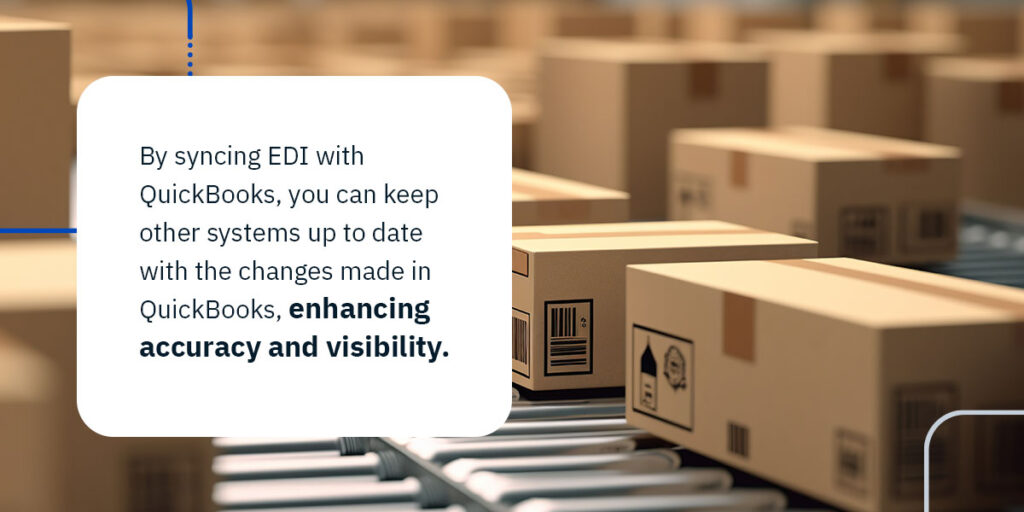How to Streamline Operations with QuickBooks

January 16, 2024
QuickBooks is a leading accounting software solution, with over 25 million U.S. businesses using it in daily operations. Whether you leverage the solution to organize tax details or complete payroll processing, QuickBooks provides many benefits.
You can get even more out of QuickBooks by integrating it with other supply chain solutions. Electronic Data Interchange (EDI) is a valuable supply chain tool that automatically exchanges electronic documents between companies. Syncing EDI with QuickBooks builds a comprehensive supply chain solution that can boost efficiency, accuracy, and more.
What Is QuickBooks?
QuickBooks is accounting software for a wide range of accounting and financial applications. From payroll processing to inventory management, QuickBooks offers many solutions that streamline manual workloads. Companies choose one or multiple applications to address specific needs and integrate more applications as necessary. For example, you can begin with implementing the accounting software and later adopt the payroll or invoicing services.
QuickBooks offers these advantages to benefit businesses:
- Accessible financial statements: Organize essential financial documents and data, such as balance sheets, invoices, payroll statements, and more. QuickBooks can also generate financial reports automatically, reducing manual data entry and workloads.
- Simplified inventory management: QuickBooks has an inventory management application that assists with maintaining stock levels and tracking inventory through the supply chain. You can improve visibility and make more informed decisions about re-ordering.
- Assistance with taxes: Many organizations use QuickBooks to gather tax information and fill out documentation. The software helps you organize details and meet all IRS tax requirements for businesses.
How a QuickBooks and TrueCommerce Integration Enhances Supply Chain Operations
Build an end-to-end supply chain solution with comprehensive QuickBooks integration options for EDI and eCommerce storefronts. Here are the top five ways that a QuickBooks and EDI integration streamlines your supply chain.
1. Automated Workflows
Integrating EDI and QuickBooks automates many manual business procedures, allowing for more efficiency throughout your supply chain. Accessible and easy-to-use interfaces streamline daily operations and make it easier to process financial documents and data. By linking the two software types, data syncs between them automatically. This data syncing minimizes manual data entry tasks and the potential for human error. You can quicken the entire sales order process, improving both customer and supplier experiences.
The integration can automate many workflows for increased efficiency. For instance, after a customer or supplier places an order for products, the QuickBooks application generates a sales order document. After a customer places an order for products, the EDI system will automatically create a sales order and integrate returning documents, like invoices, to the customer to eliminate any manual entry. This streamlined workflow allows for faster order processing — order details become available more quickly, letting workers begin the fulfillment process in less time.
2. Scalability Options
You can scale your QuickBooks applications and EDI systems to meet business growth. Smaller businesses often use basic forms of accounting software or EDI, then adjust specifications once the growth of their business meets expected growth thresholds. TrueCommerce EDI integrations for QuickBooks allow for seamless scalability. As your company expands, you can add more applications and features to meet demand.
As you incorporate new tools, users, products, or other features, the EDI integration remains stable and powerful. No need to switch to a different provider or system — TrueCommerce EDI is built to handle advanced workloads while maintaining performance. Both your QuickBooks accounting software and EDI can provide support during any business changes.
3. Improved Visibility

Visibility is vital for accuracy and efficiency in the supply chain. The more transparency you have, the more you can prevent inaccurate orders or lost items. Enhanced visibility also strengthens supplier relationships and consumer satisfaction.
You can improve visibility with QuickBooks and EDI integrations. QuickBooks’s inventory management system provides real-time visibility into inventory levels, making it easier to finalize buying decisions. Instant alerts notify you of low stock, preventing shortages or stock-outs. In addition, the software develops summary reports about buying trends that highlight popular items. These insights help you understand consumer and supplier interests, which you can use to optimize inventory levels.
By syncing EDI with QuickBooks, you can keep other systems up to date with the changes made in QuickBooks, enhancing accuracy and visibility. The EDI solution pulls inventory information from QuickBooks and publishes it to the customer or online selling channels, ensuring accurate inventory levels and decreasing the risk of customers purchasing products that cannot be fulfilled.
4. Enhanced Supplier Communications
EDI integrations for QuickBooks can assist with communication between suppliers and retailers. Both parties depend on accurate data to inform how they do business. To keep operations flowing smoothly, for instance, retailers need to know when to expect shipments, and suppliers must know when they’re needed. The easy flow of data facilitated by a QuickBooks EDI integration can help suppliers and retailers stay connected accurately and automatically. It also ensures that communications happen in the right format for each party.
Strengthening this relationship can offer significant advantages. Suppliers can keep themselves in good standing with retailers by eliminating friction and miscommunications. A strong track record of accurate, on-time transactions could help during negotiations or provide leniency when necessary. Overall, a QuickBooks integration helps you maintain good communications and beneficial partnerships through reliable, accurate EDI transactions.
5. Increased Accuracy
Both QuickBooks and EDI heighten accuracy across your supply chain. EDI automatically transfers documents between suppliers, eliminating manual typing and data entry. QuickBooks generates financial reports and organizes financial details without additional manual input. In addition to improving efficiency, these features increase accuracy. Automatic data transfers minimize the possibility of human error. Built-in controls check inserted data and alert users of invalid or empty fields.
For instance, the EDI solution can instantly determine whether order details and prices align with QuickBooks data. Details such as customer and item IDs are verified to eliminate mishaps. The improved accuracy reduces canceled orders or further mistakes. By enhancing accuracy, you can reduce costs in the long term.
Integrate QuickBooks with EDI
QuickBooks streamlines financial procedures, letting supply chains work more productively and precisely. By linking your QuickBooks solution with EDI and other applications, you centralize all business data. The result is a significant boost in accuracy, improved supplier relationships, and greater resiliency.
TrueCommerce offers a cloud-based and intuitive integration for QuickBooks that benefits many supply chain procedures. Automated features minimize manual data entry, allowing your team to focus on higher-priority tasks.
Transform your supply chain to move more efficiently and proactively. To learn more, contact us today.

Share this post:
Stay ahead of the competition
Get expert supply chain insights delivered directly to your inbox weekly.